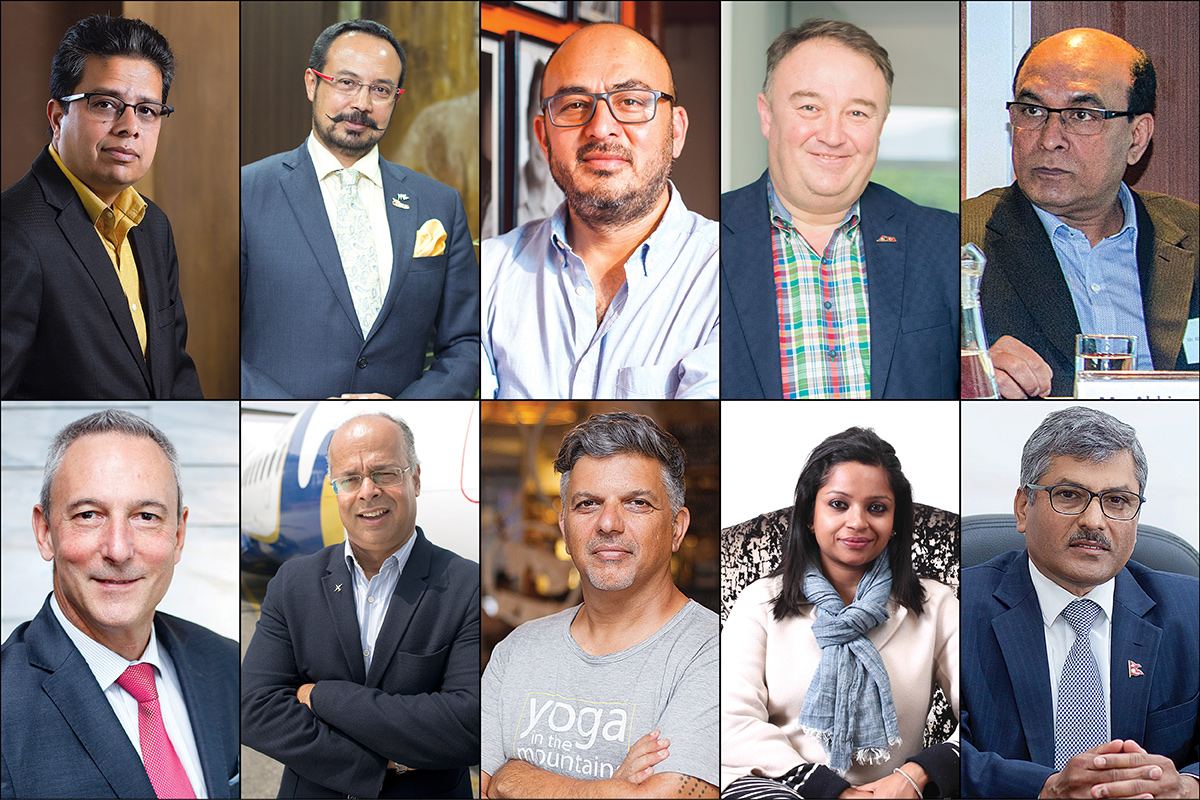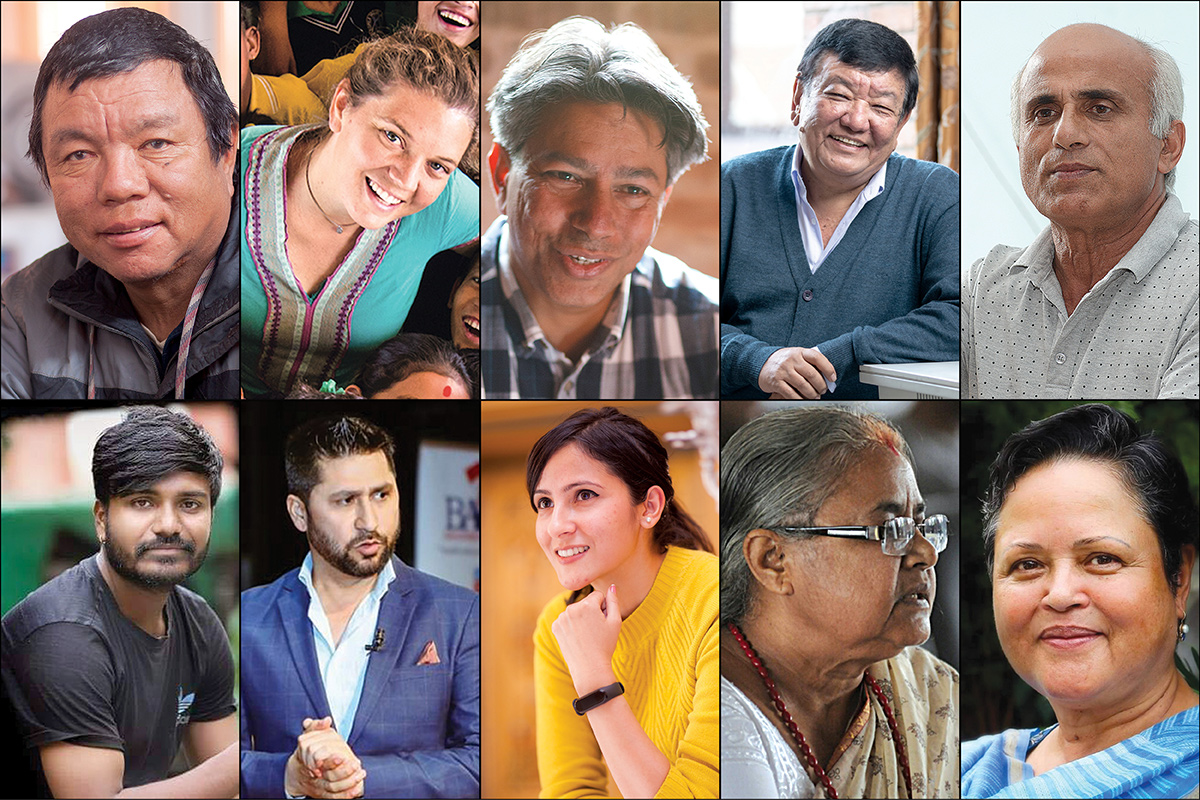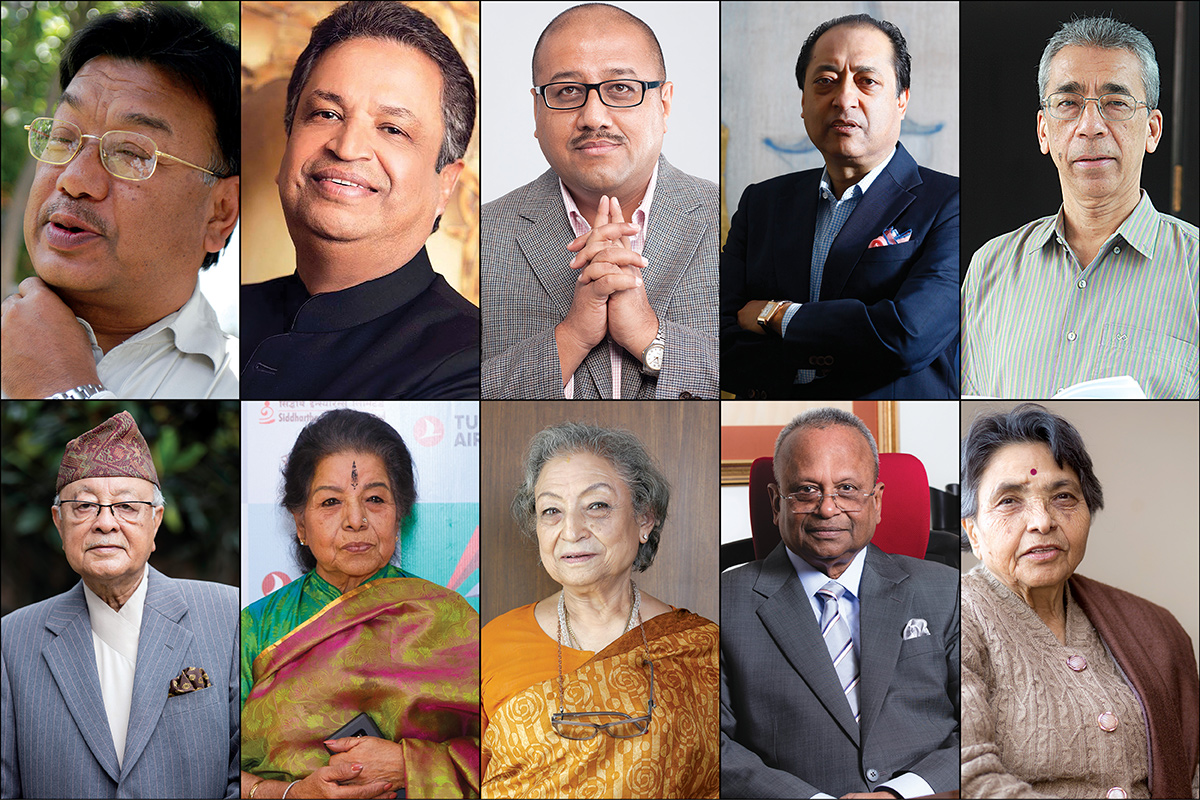
KARAN SAKYA
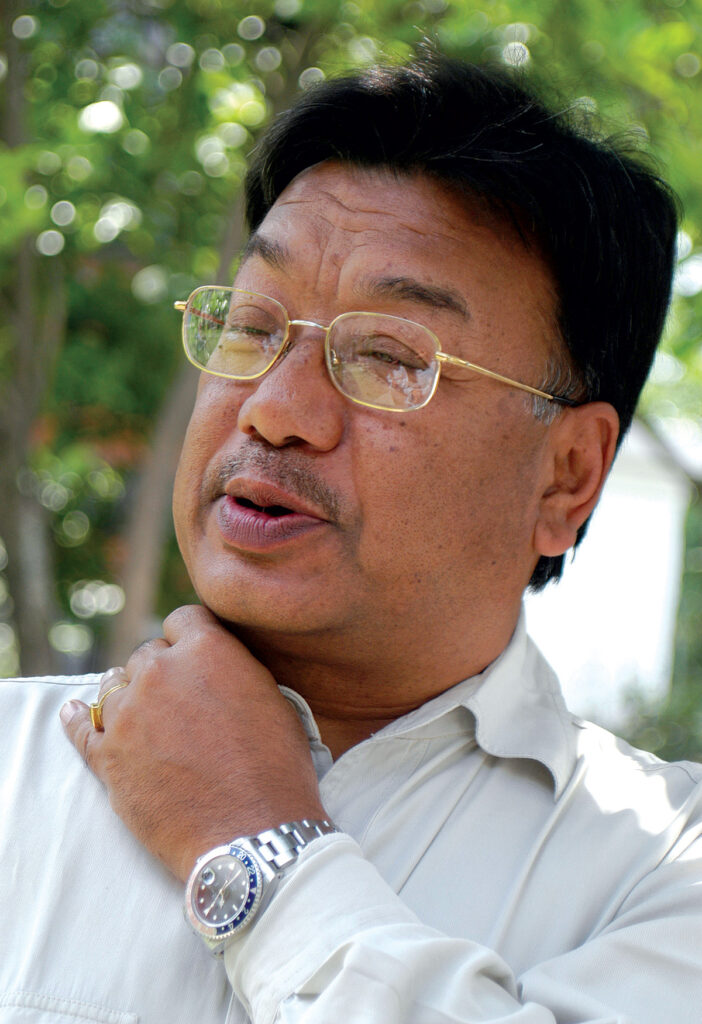 An environmentalist and forester by academia, Karna Sakya started his career as a wildlife officer and was an active part in the establishment of Chitwan National Park, Nepal’s very first national park. However, he stepped down from government service to enter the tourism and hospitality industry. His first step in this direction was to open the Kathmandu Guest House, then a humble 13 room abode that was run by the Sakya family. The success of Kathmandu Guest House is credited by many to the rise of Thamel as one of Nepal’s most prominent tourist destinations, and Sakya as s visionary who led this move. He is the founder of KGH Group which is Nepal’s leading hotel chain with seven eco-friendly hotels under its flagship. Besides his impressive portfolio of hotels, Sakya is also credited for initiating the very first tourism project “Visit Nepal Year 1998”. He is also a celebrated author who has books like Soch, Moj, Kosh, Khoj, Ma Sakchu under his name.
An environmentalist and forester by academia, Karna Sakya started his career as a wildlife officer and was an active part in the establishment of Chitwan National Park, Nepal’s very first national park. However, he stepped down from government service to enter the tourism and hospitality industry. His first step in this direction was to open the Kathmandu Guest House, then a humble 13 room abode that was run by the Sakya family. The success of Kathmandu Guest House is credited by many to the rise of Thamel as one of Nepal’s most prominent tourist destinations, and Sakya as s visionary who led this move. He is the founder of KGH Group which is Nepal’s leading hotel chain with seven eco-friendly hotels under its flagship. Besides his impressive portfolio of hotels, Sakya is also credited for initiating the very first tourism project “Visit Nepal Year 1998”. He is also a celebrated author who has books like Soch, Moj, Kosh, Khoj, Ma Sakchu under his name.
BINOD CHAUDHARY
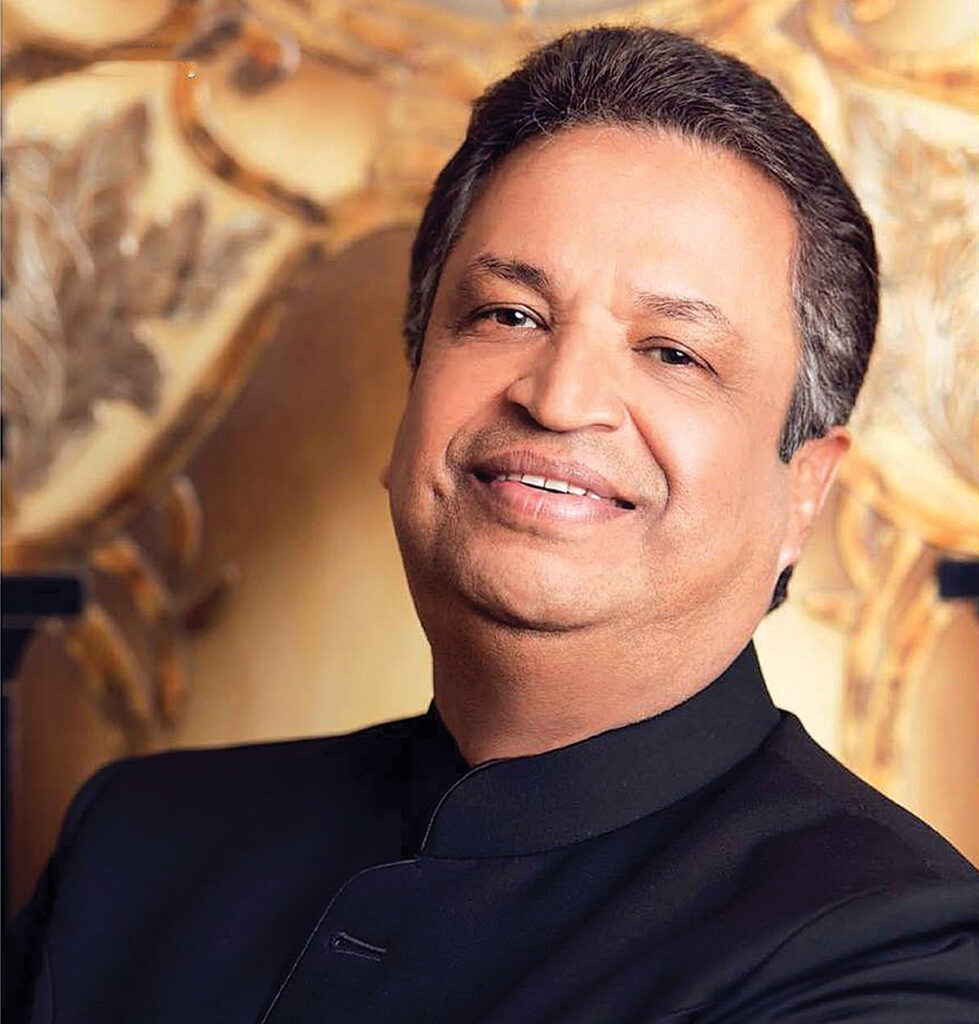 Binod Chaudhary is Nepal’s first and only businessman to enter the Forbes billionaire list. At the time of writing this, his real time net worth according to Forbes is $1.4B. Chaudhary chairs the CG Corp Global, a multinational conglomerate of 167 Companies, 79 Brands in 24 countries over 13,000 employees across the world. CG Corp Global invests in businesses across 16 industry verticals including education, hospitality, consumer goods, real estate, banking, finance, Ayurveda and electronics. Under the CG Foods, Wai Wai overseas factories are located in India, Serbia, Bangladesh and Egypt. Chaudhary has a controlling stake in the Nabil Bank of Nepal. Sixty of the group’s 94 operating hotels are in India. Overall, 4,654 keys are spread over 65 destinations, nine countries, while another 36 hotels in over 22 destinations are in the pipeline. For years, Chaudhary had been passionately persuading his desire to launch a new telecom company in Nepal. But the project, CG LifeCell, has faced hiccups every time. CG Telecom has not been granted a unified license yet.
Interestingly, Chaudhary’s initial business venture, outside the family business, was Copper Floor, a nightclub frequented by hippies, members of royal family among others. Chaudhary has also dabbled in politics. He had been elected in the first Constituent Assembly under the UML’s PR quota. Later, the Nepali Congress (NC) picked Binod Chaudhary as its candidate for the federal parliament under the proportional representation (PR) system.
His inspirational life journey has been documented in a book. Chaudhary bared it all in his autobiography, Making It Big.
He believes that philanthropy should be ‘the backbone’ of every business. In 2015 when Nepal was hit with 7.8 Richter scale earthquake, Chaudhary pledged $2.5 million through his Chaudhary Foundation to restore schools and homes destroyed or damaged by the quake.
Binod Chaudhary is Nepal’s first and only businessman to enter the Forbes billionaire list. At the time of writing this, his real time net worth according to Forbes is $1.4B. Chaudhary chairs the CG Corp Global, a multinational conglomerate of 167 Companies, 79 Brands in 24 countries over 13,000 employees across the world. CG Corp Global invests in businesses across 16 industry verticals including education, hospitality, consumer goods, real estate, banking, finance, Ayurveda and electronics. Under the CG Foods, Wai Wai overseas factories are located in India, Serbia, Bangladesh and Egypt. Chaudhary has a controlling stake in the Nabil Bank of Nepal. Sixty of the group’s 94 operating hotels are in India. Overall, 4,654 keys are spread over 65 destinations, nine countries, while another 36 hotels in over 22 destinations are in the pipeline. For years, Chaudhary had been passionately persuading his desire to launch a new telecom company in Nepal. But the project, CG LifeCell, has faced hiccups every time. CG Telecom has not been granted a unified license yet.
Interestingly, Chaudhary’s initial business venture, outside the family business, was Copper Floor, a nightclub frequented by hippies, members of royal family among others. Chaudhary has also dabbled in politics. He had been elected in the first Constituent Assembly under the UML’s PR quota. Later, the Nepali Congress (NC) picked Binod Chaudhary as its candidate for the federal parliament under the proportional representation (PR) system.
His inspirational life journey has been documented in a book. Chaudhary bared it all in his autobiography, Making It Big.
He believes that philanthropy should be ‘the backbone’ of every business. In 2015 when Nepal was hit with 7.8 Richter scale earthquake, Chaudhary pledged $2.5 million through his Chaudhary Foundation to restore schools and homes destroyed or damaged by the quake.
SUJEEV SHAKYA
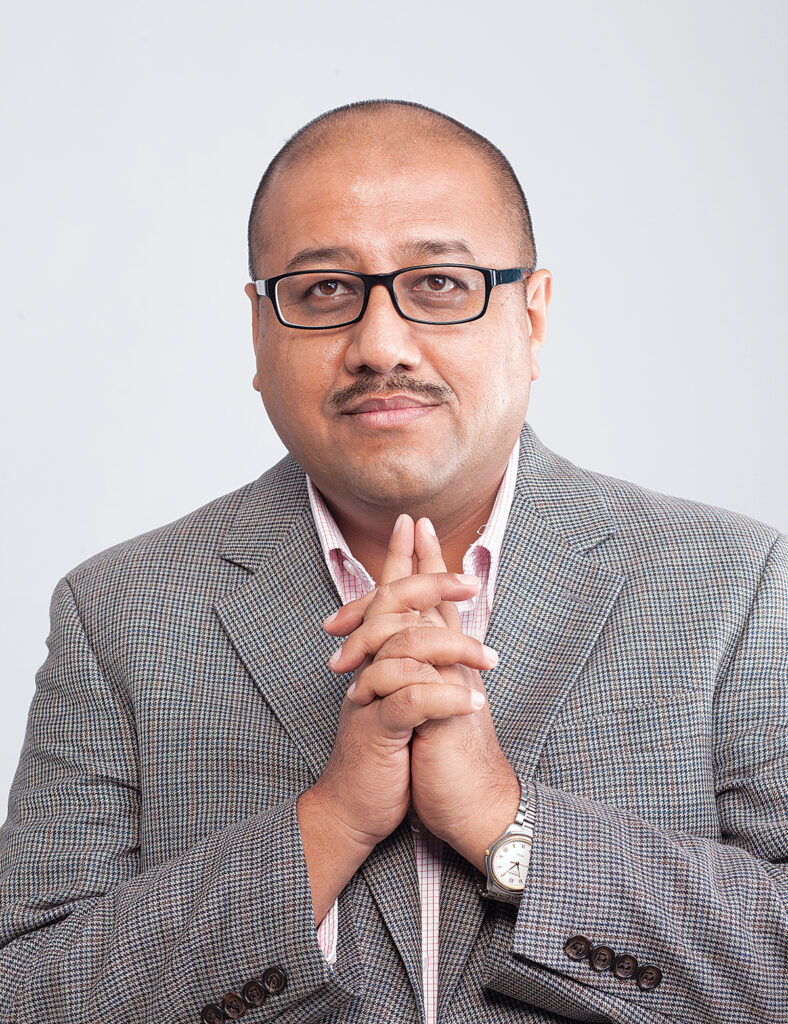 Sujeev Shakya is an author, speaker, thoughtpreneur and thought leader. He is also the founder CEO of beed, a Nepal based management consulting and financial advisory firm that is currently working in Bhutan, Cambodia, India, Myanmar, Nepal and Rwanda. He serves as the Founder and Chairperson of Nepal Economic Forum which he established in 2009. It has been consistently ranked as Top 100 think tanks in Asia Pacific by Global Go To Think Tank Index Report. Adding to his illustrious profile, he is also the author of Unleashing Nepal and Unleashing The Vajra, Arthat Arthatantra, Arthat Pariwartan among others.
After investing two decades at Nepal’s largest business group, Tara Management of the Soaltee Group, he left as group president to begin a multi-dimensional career engaging in consulting, advisory, writing, speaking, coaching and inspiring people. He also serves as Senior Advisor - Bhutan and Nepal for Bower Group Asia.
He leads beed knowledge center’s curations including the Kantipur Conclave. He served as Secretary General of Himalayan Consensus Institute 2014-2019. He speaks extensively on leadership, business and economic development issues. His leadership journey has been developed as a case study and taught at the Babson College US for its MS Entrepreneurial Leadership program.
Sujeev Shakya is an author, speaker, thoughtpreneur and thought leader. He is also the founder CEO of beed, a Nepal based management consulting and financial advisory firm that is currently working in Bhutan, Cambodia, India, Myanmar, Nepal and Rwanda. He serves as the Founder and Chairperson of Nepal Economic Forum which he established in 2009. It has been consistently ranked as Top 100 think tanks in Asia Pacific by Global Go To Think Tank Index Report. Adding to his illustrious profile, he is also the author of Unleashing Nepal and Unleashing The Vajra, Arthat Arthatantra, Arthat Pariwartan among others.
After investing two decades at Nepal’s largest business group, Tara Management of the Soaltee Group, he left as group president to begin a multi-dimensional career engaging in consulting, advisory, writing, speaking, coaching and inspiring people. He also serves as Senior Advisor - Bhutan and Nepal for Bower Group Asia.
He leads beed knowledge center’s curations including the Kantipur Conclave. He served as Secretary General of Himalayan Consensus Institute 2014-2019. He speaks extensively on leadership, business and economic development issues. His leadership journey has been developed as a case study and taught at the Babson College US for its MS Entrepreneurial Leadership program.
PRITHVI BAHADUR PANDE
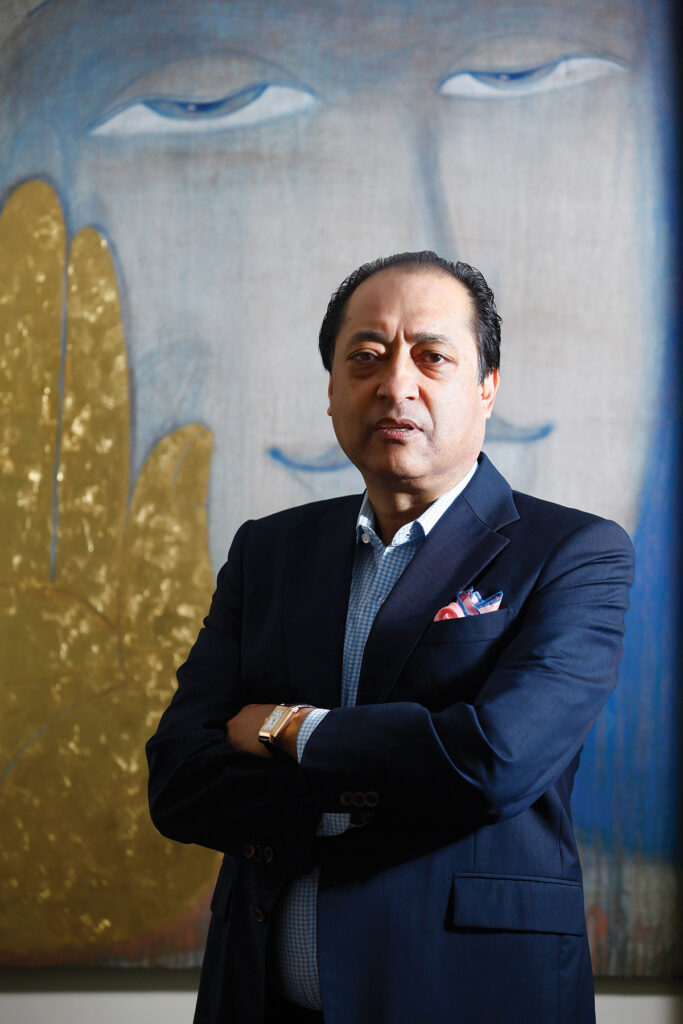 The Chairman of Nepal Investment Bank Limited (NIBL), Prithvi Bahadur Pande completed his CA degree in 1978 from Delhi. There were very few Chartered Accountants then and the demand for CAs was exceptionally high, which he says made it possible for him to immediately get a job in Nepal Rastra Bank. Pandé started his banking career as a chartered accountant with NRB in October 1978. Following a decade-long service at the Central Bank, Pandé with other partners went on to initiate the first Nepali-led joint venture bank, Himalayan Bank Ltd, in 1988. Himalayan Bank was the first Bank with majority share of Nepalis and managed by Nepalis. After managing Himalayan Bank for 10 years, Pandé became engaged with Nepal Indo Suez Bank, current NIBL. He joined NIBL in 2001 as Executive Director, and later became the Executive Chairman of the bank.
Hailed as pioneer Banker, he has made many contributions to promote and strengthen the private banking sector. He is also the former President of Nepal Bankers Association (NBA).
Pandé is also the Chairman of Himalayan Infrastructure Fund, a private equity company, through which he and his team invest in hydropower projects. Chhaya Center at Thamel is Pande’s first tourism venture. Pande is also known as an avid art collector and a patron to Nepali artists. With NIBL and Kathmandu Valley Preservation Trust, he has worked to renovate and restore various heritage sites such as Sundari Chowk in Patan and Kaal Bhairav at the Kathmandu Durbar Square.
The Chairman of Nepal Investment Bank Limited (NIBL), Prithvi Bahadur Pande completed his CA degree in 1978 from Delhi. There were very few Chartered Accountants then and the demand for CAs was exceptionally high, which he says made it possible for him to immediately get a job in Nepal Rastra Bank. Pandé started his banking career as a chartered accountant with NRB in October 1978. Following a decade-long service at the Central Bank, Pandé with other partners went on to initiate the first Nepali-led joint venture bank, Himalayan Bank Ltd, in 1988. Himalayan Bank was the first Bank with majority share of Nepalis and managed by Nepalis. After managing Himalayan Bank for 10 years, Pandé became engaged with Nepal Indo Suez Bank, current NIBL. He joined NIBL in 2001 as Executive Director, and later became the Executive Chairman of the bank.
Hailed as pioneer Banker, he has made many contributions to promote and strengthen the private banking sector. He is also the former President of Nepal Bankers Association (NBA).
Pandé is also the Chairman of Himalayan Infrastructure Fund, a private equity company, through which he and his team invest in hydropower projects. Chhaya Center at Thamel is Pande’s first tourism venture. Pande is also known as an avid art collector and a patron to Nepali artists. With NIBL and Kathmandu Valley Preservation Trust, he has worked to renovate and restore various heritage sites such as Sundari Chowk in Patan and Kaal Bhairav at the Kathmandu Durbar Square.
PADMA JYOTI
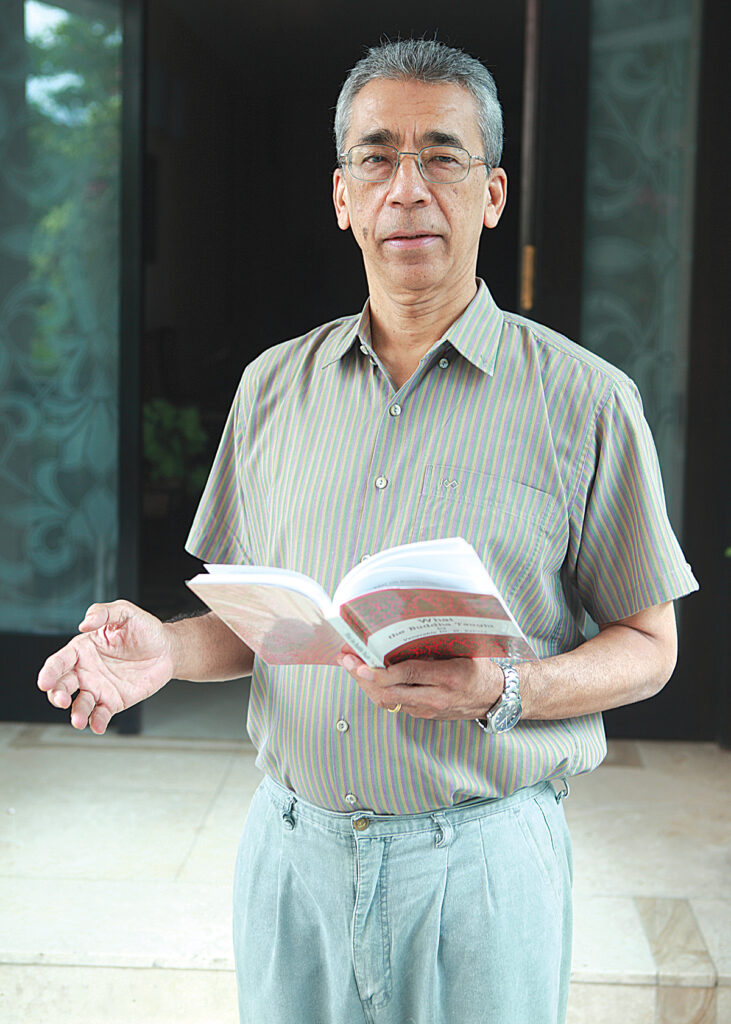 Padma Jyoti, Chairman of Jyoti Group, is a third generation businessman whose grandfather Bhajuratna Kansakar laid the groundwork for the family business when he opened a clothe shop in the early 20th century. Today, Jyoti Group has presence in multiple business verticals: trading, manufacturing, service, hydro, insurance, health and agriculture. Some of the notable businesses of the Jyoti Group include Himal Iron and Steel, Himal Wires, Himal Oxygen, Jyoti Spinning Mills, Syakar Trading Company, Bhajuratna Engineering and Sales.
Padma Jyoti earned his B.Tech. in Mechanical Engineering from IIT Kanpur, India and S.M. from Sloan School of Management, Massachusetts Institute of Technology, USA. He has more than 17 years of experience in hydropower along with 48 years of experience in industries and business operations. He is also the director at Shangri-La Energy. He is the past President of National Business Initiative besides having held the position of President of the Federation of Nepalese Chambers of Commerce and Industries.
Jyoti Group also has investments in Hotel Aloft, Grande International Hospital, Sagarmatha Insurance, Butwal Power Company Limited, MaHa Himal Agriculture and Baskin-Robbins.
Padma Jyoti is recognised as a highly stable businessman with a strong sense of purpose and business ethic.
Padma Jyoti, Chairman of Jyoti Group, is a third generation businessman whose grandfather Bhajuratna Kansakar laid the groundwork for the family business when he opened a clothe shop in the early 20th century. Today, Jyoti Group has presence in multiple business verticals: trading, manufacturing, service, hydro, insurance, health and agriculture. Some of the notable businesses of the Jyoti Group include Himal Iron and Steel, Himal Wires, Himal Oxygen, Jyoti Spinning Mills, Syakar Trading Company, Bhajuratna Engineering and Sales.
Padma Jyoti earned his B.Tech. in Mechanical Engineering from IIT Kanpur, India and S.M. from Sloan School of Management, Massachusetts Institute of Technology, USA. He has more than 17 years of experience in hydropower along with 48 years of experience in industries and business operations. He is also the director at Shangri-La Energy. He is the past President of National Business Initiative besides having held the position of President of the Federation of Nepalese Chambers of Commerce and Industries.
Jyoti Group also has investments in Hotel Aloft, Grande International Hospital, Sagarmatha Insurance, Butwal Power Company Limited, MaHa Himal Agriculture and Baskin-Robbins.
Padma Jyoti is recognised as a highly stable businessman with a strong sense of purpose and business ethic.
HIMALAYAN SJB RANA
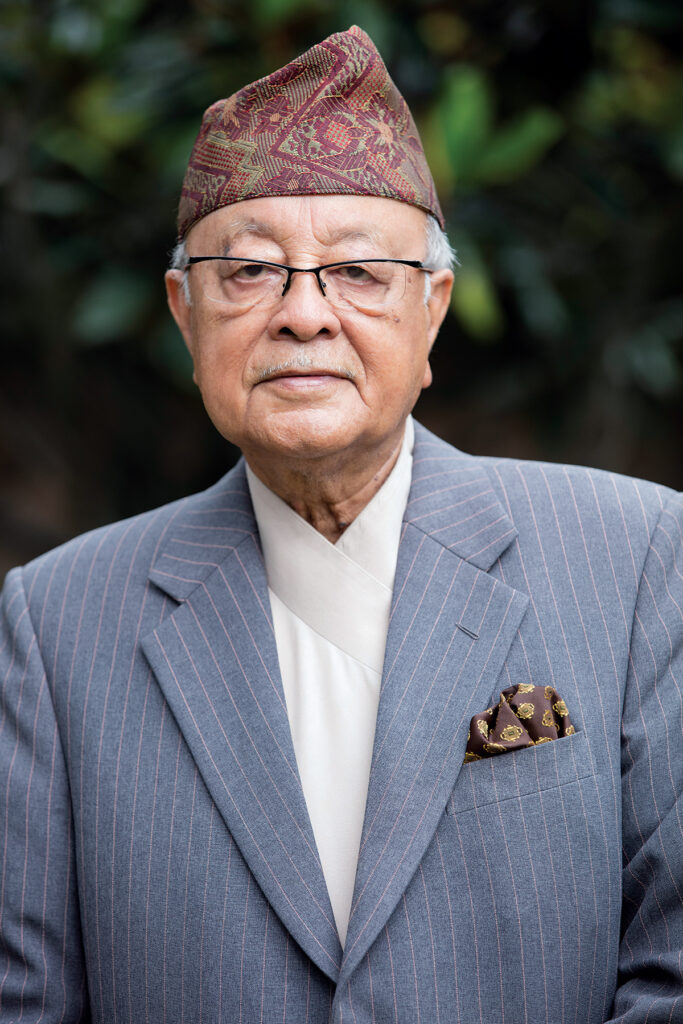 He was the first Finance Secretary and the first Governor of Nepal Rastra Bank. As a Governor, Rana introduced a number of reforms and regulations. Among many achievements, Rana succeeded in circulating the Nepali currency as a legal tender in the Terai region of the country where Indian currency was in use; to eliminate the dual currency system from the country a law was enacted. It was during his tenure that the NRB issued currency notes for the first time on February 19, 1960. Through NRB, Nepal has become independent in carrying out transactions in foreign exchange which until then had to be done through the Reserve Bank of India. Besides, he persuaded the Nepal government to declare unlimited convertibility between the Nepali and Indian rupees at the exchange rate of Rs.160.00 Nepali to Indian Rs.100.00. The rate of exchange prevails even now.
After his retirement in 1961 from NRB, Rana joined the UN service from 1962 until 1986 in the capacity of the Deputy Resident Representative to Sri Lanka and Afghanistan. Later, he was appointed the Resident Representative of the UN to Myanmar, Indonesia and Pakistan. In 1983, he along with other partners, established a joint venture bank, Himalayan Bank with Habib Bank of Pakistan. For four years, Rana was the Chairman of the Himalayan Bank. Moreover, he is the Former Chairman at Nirdhan Utthan Bank. Rana is also the Chairman of the General Election Observation Committee (GEOC). A true pioneer and visionary, Himalaya SJB Rana is among the very few Nepalis who is respected highly for his contributions and associations professionally.
He was the first Finance Secretary and the first Governor of Nepal Rastra Bank. As a Governor, Rana introduced a number of reforms and regulations. Among many achievements, Rana succeeded in circulating the Nepali currency as a legal tender in the Terai region of the country where Indian currency was in use; to eliminate the dual currency system from the country a law was enacted. It was during his tenure that the NRB issued currency notes for the first time on February 19, 1960. Through NRB, Nepal has become independent in carrying out transactions in foreign exchange which until then had to be done through the Reserve Bank of India. Besides, he persuaded the Nepal government to declare unlimited convertibility between the Nepali and Indian rupees at the exchange rate of Rs.160.00 Nepali to Indian Rs.100.00. The rate of exchange prevails even now.
After his retirement in 1961 from NRB, Rana joined the UN service from 1962 until 1986 in the capacity of the Deputy Resident Representative to Sri Lanka and Afghanistan. Later, he was appointed the Resident Representative of the UN to Myanmar, Indonesia and Pakistan. In 1983, he along with other partners, established a joint venture bank, Himalayan Bank with Habib Bank of Pakistan. For four years, Rana was the Chairman of the Himalayan Bank. Moreover, he is the Former Chairman at Nirdhan Utthan Bank. Rana is also the Chairman of the General Election Observation Committee (GEOC). A true pioneer and visionary, Himalaya SJB Rana is among the very few Nepalis who is respected highly for his contributions and associations professionally.
SHANTI CHADHA
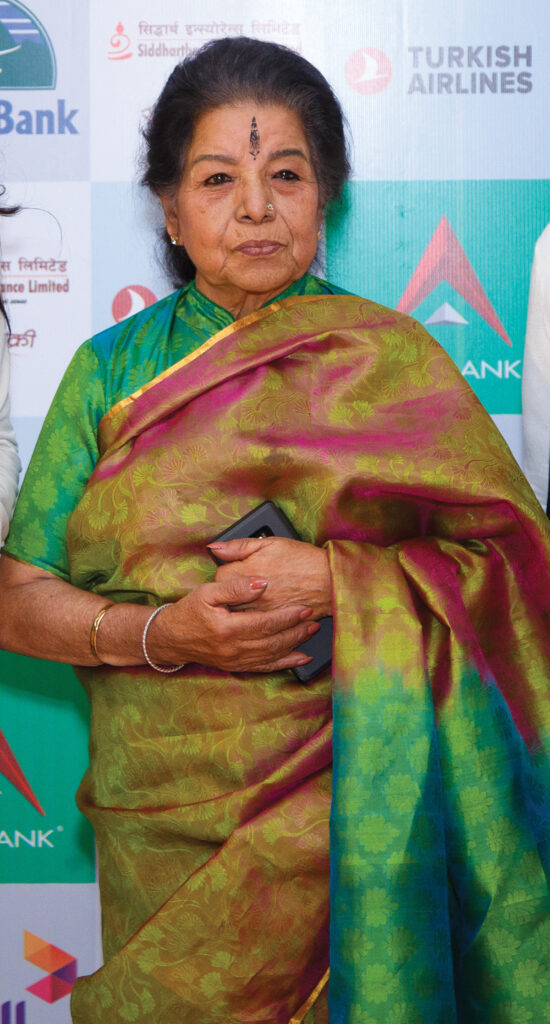 Shanti Chadha is the Founder President of Federation of Women Entrepreneurs Association of Nepal. Chadha has impacted thousands of women and families through skill development and economic empowerment initiatives through her personal efforts, her businesses, and her affiliation with several organisations.
She specialises in marketing management, enterprise and export management and skills development and has undergone studies with reputed international institutions like Cranfield University (UK), Boston College (USA), Helsinki School of Economics (Finland), University of Philippines. Widely travelled through the globe, she began her career at the age of 15 as the personal secretary to the Nepalese Ambassador to Rome. She is also a licensed guide, worked in the travel business, introduced the first mountain flight in Nepal, is a trained interior designer, and has worked with the government with the Women’s Skill Development Project in the eighties.
She is represented on the board of several organisations and is a founder member of WEAN (Women Entrepreneurs Association of Nepal), founder Vice President of the SAARC Women Entrepreneur Council, founder member of Hastakala, Executive Member for three consecutive terms of FNCCI, founder Vice President of South Asian Women Development Forum, founder member of WEAN Cooperative and Manushi among others. Her personal initiative is Nepal Woman Crafts of which she is the Managing Director.
Chadha is the recipient of several national and international awards and honours including the SAARC medal, Desh Naresh Samaj Sewa Padak, Woman of the Year 2003 and SAARC Best Woman Entrepreneur 2010.
A strong proponent of economic empowerment of women, she also believes in ‘no aid, but trade’. She has pioneered several business initiatives in the country, encouraged collaboration and ideas exchange, and fostered and mentored individuals and organisations towards economic inventiveness and development.
Shanti Chadha is the Founder President of Federation of Women Entrepreneurs Association of Nepal. Chadha has impacted thousands of women and families through skill development and economic empowerment initiatives through her personal efforts, her businesses, and her affiliation with several organisations.
She specialises in marketing management, enterprise and export management and skills development and has undergone studies with reputed international institutions like Cranfield University (UK), Boston College (USA), Helsinki School of Economics (Finland), University of Philippines. Widely travelled through the globe, she began her career at the age of 15 as the personal secretary to the Nepalese Ambassador to Rome. She is also a licensed guide, worked in the travel business, introduced the first mountain flight in Nepal, is a trained interior designer, and has worked with the government with the Women’s Skill Development Project in the eighties.
She is represented on the board of several organisations and is a founder member of WEAN (Women Entrepreneurs Association of Nepal), founder Vice President of the SAARC Women Entrepreneur Council, founder member of Hastakala, Executive Member for three consecutive terms of FNCCI, founder Vice President of South Asian Women Development Forum, founder member of WEAN Cooperative and Manushi among others. Her personal initiative is Nepal Woman Crafts of which she is the Managing Director.
Chadha is the recipient of several national and international awards and honours including the SAARC medal, Desh Naresh Samaj Sewa Padak, Woman of the Year 2003 and SAARC Best Woman Entrepreneur 2010.
A strong proponent of economic empowerment of women, she also believes in ‘no aid, but trade’. She has pioneered several business initiatives in the country, encouraged collaboration and ideas exchange, and fostered and mentored individuals and organisations towards economic inventiveness and development.
AMBICA SHRESTHA
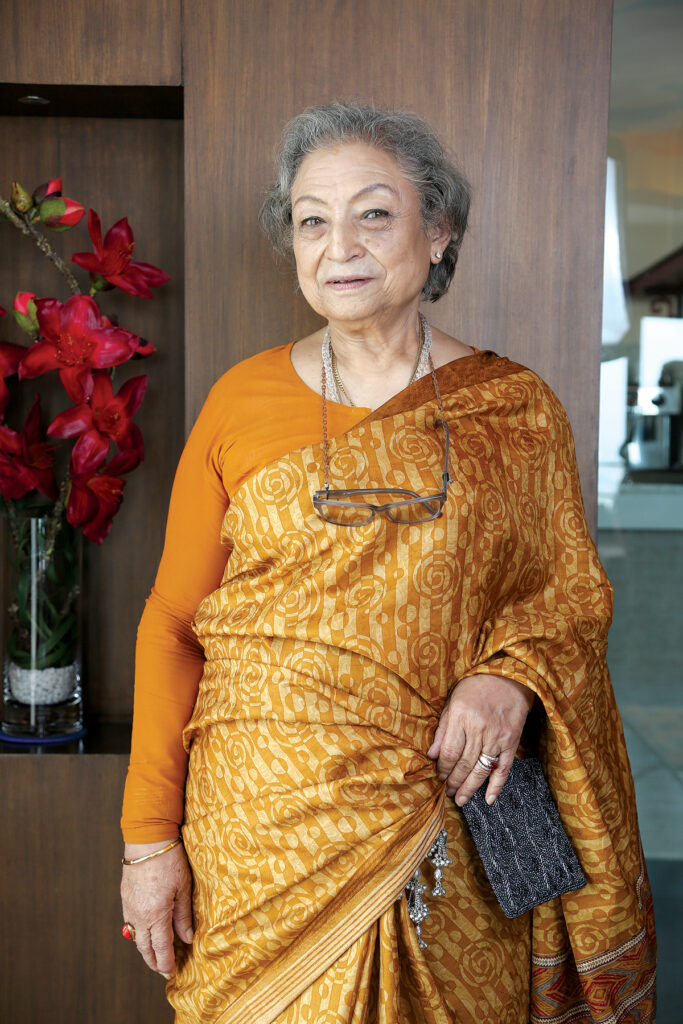 Ambica Shrestha is the President of the Dwarika’s Group of Hotels and Resorts. Apart from owning the Dwarika’s Hotel, she also leads the Nepalese Heritage Society and Business and Professional Women Nepal which works in field of preserving the cultural heritage of Nepal and for the upliftment of underprivileged women respectively.
After the demise of her husband in 1991, Shrestha single-handedly managed the hotel she had established with her husband in 1977. She raised the small hotel initially with five rooms into one of the most reputed and traditional hotels of the world.
She is the President of Kathmandu Travel and Tours, Honorary Consulate General of Spain for Nepal and an influential figure in tourism.
Shrestha was recently honoured with “Nabil Skill Hero 2020” award in the field of Tourism and Hospitality. Among various other recognitions and awards that she has received are Gorkha Dakshin Bahu 4th and Prakhyat Trishaktti Patta by His Majesty the King of Nepal, Badge of Honour by BPW International, Decoration of the Cruz de Official De la Orden De Isabel La Catolica – His Majesty the King Juan Carlos I, Spain and the highest Rotary ‘Service Above Self’ Award.
Ambica Shrestha is the President of the Dwarika’s Group of Hotels and Resorts. Apart from owning the Dwarika’s Hotel, she also leads the Nepalese Heritage Society and Business and Professional Women Nepal which works in field of preserving the cultural heritage of Nepal and for the upliftment of underprivileged women respectively.
After the demise of her husband in 1991, Shrestha single-handedly managed the hotel she had established with her husband in 1977. She raised the small hotel initially with five rooms into one of the most reputed and traditional hotels of the world.
She is the President of Kathmandu Travel and Tours, Honorary Consulate General of Spain for Nepal and an influential figure in tourism.
Shrestha was recently honoured with “Nabil Skill Hero 2020” award in the field of Tourism and Hospitality. Among various other recognitions and awards that she has received are Gorkha Dakshin Bahu 4th and Prakhyat Trishaktti Patta by His Majesty the King of Nepal, Badge of Honour by BPW International, Decoration of the Cruz de Official De la Orden De Isabel La Catolica – His Majesty the King Juan Carlos I, Spain and the highest Rotary ‘Service Above Self’ Award.
VIJAY K SHAH
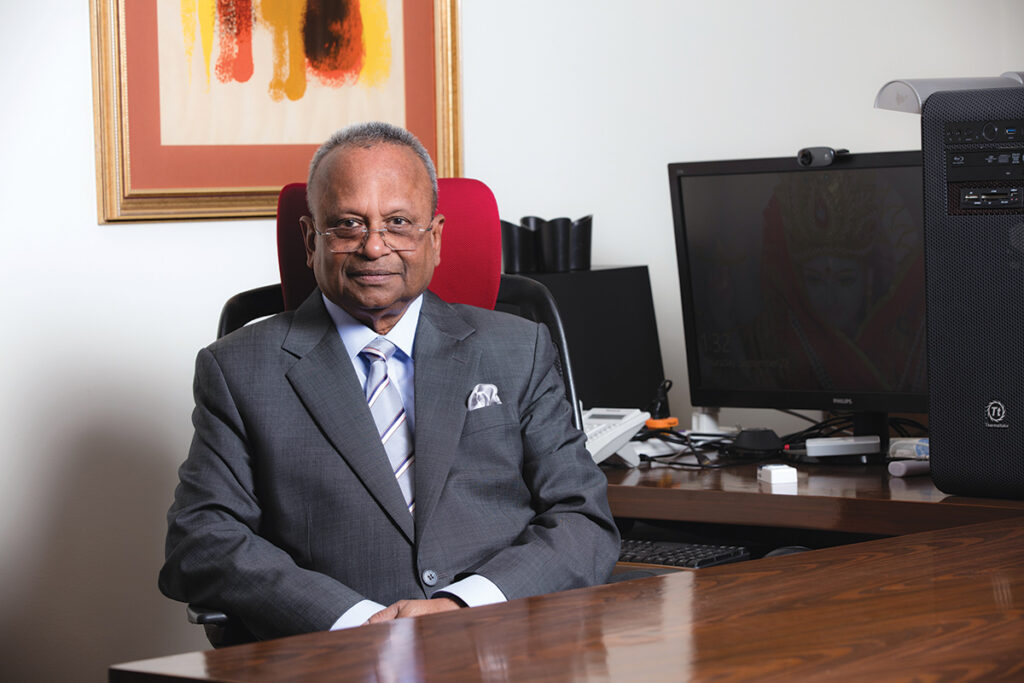 Vijay K Shah is Founder Chairman of Jawalakhel Group of Industries, a business conglomerate managing multiple companies that manufacture and distribute alcoholic beverages. After returning to Nepal in 1969 from the US with the required expertise, Shah took the business that was still running on the traditional methods of making alcohol and injected best practices from around the globe to make way for JGI to become the undisputed leader in the alco-beverage business in the country. He also started Himalayan Distillery which is the world’s first 13-column distillation system, an innovation way ahead of its time in Nepal. Ruslan vodka was born in 1973 and is an iconic Nepali brand equally loved today as it has been since its inception. The Jawalakhel Group forayed into the beer market in 2013 and owns a state of the art brewery that has joined hands with international companies of high acclaim such as Warsteiner, Germany in 2015 and AB InBev in 2019.
During his engagement with various organisations like FNCCI, CNI and Beverage Association of Nepal, Shah, a strong proponent of corporate governance and ethical practices, had been closely involved in helping improve the business climate and influencing progressive policy change in the country.
Vijay K Shah is Founder Chairman of Jawalakhel Group of Industries, a business conglomerate managing multiple companies that manufacture and distribute alcoholic beverages. After returning to Nepal in 1969 from the US with the required expertise, Shah took the business that was still running on the traditional methods of making alcohol and injected best practices from around the globe to make way for JGI to become the undisputed leader in the alco-beverage business in the country. He also started Himalayan Distillery which is the world’s first 13-column distillation system, an innovation way ahead of its time in Nepal. Ruslan vodka was born in 1973 and is an iconic Nepali brand equally loved today as it has been since its inception. The Jawalakhel Group forayed into the beer market in 2013 and owns a state of the art brewery that has joined hands with international companies of high acclaim such as Warsteiner, Germany in 2015 and AB InBev in 2019.
During his engagement with various organisations like FNCCI, CNI and Beverage Association of Nepal, Shah, a strong proponent of corporate governance and ethical practices, had been closely involved in helping improve the business climate and influencing progressive policy change in the country.
Dr. MEENA ACHARYA
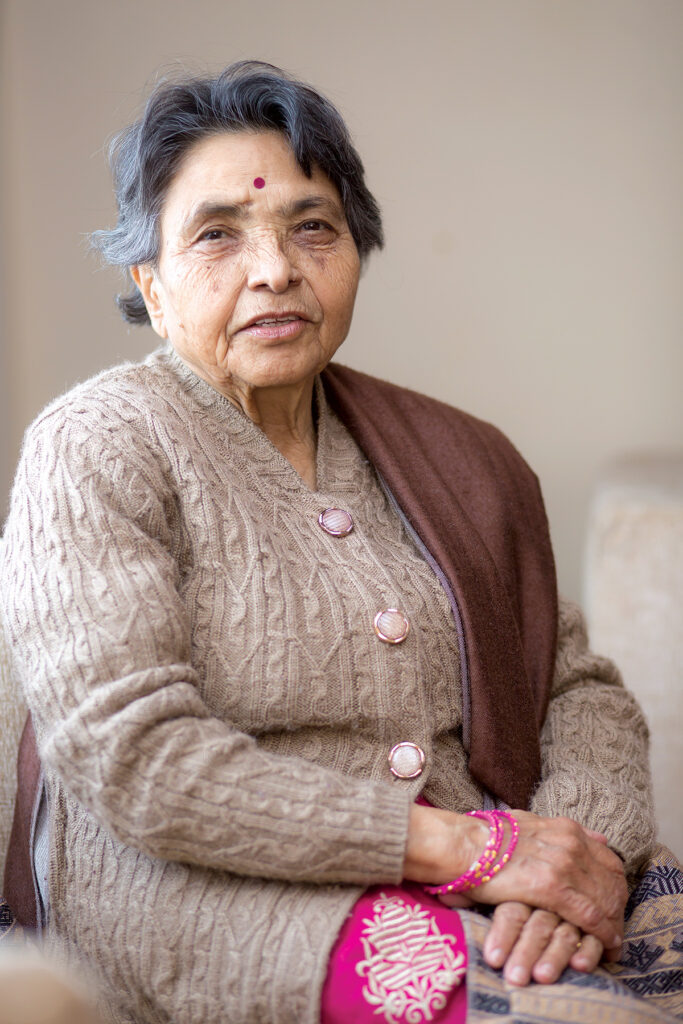 Dr. Meena Acharya is an economist, researcher, consultant and author. Dr Acharya received her MS degree in Economic Cybernetics from Moscow State University in 1966 and a PhD in Development Studies from the University of Wisconsin in 1987. She worked at Nepal Rastra Bank as the Chief Economic Advisor (1978-80) and Chief Manager of the Development Finance Department (1986-90). In 1981-82, she also worked as an economist at the World Bank headquarters in Washington DC. From 1990 to 1994, Dr Acharya headed the Institute for Integrated Development Studies (IIDS), one of the first non-governmental research organisations in Nepal. She has also worked as a consultant for UNDP, UNIFEM, FAO, the Asian Development Bank, and the World Bank. She has received a number of awards for her work including IDRC Research Scholarship in 1979, Gold Medals for distinction for her MA and Ph.D. and Fulbright New Century Scholar Award, 2004/2005.
Between 2016 and 2018, she served as Adviser for Women’s Empowerment and Economic Development to the President of Nepal. Dr. Acharya is also a member of the International Association for Feminist Economics. She has been writing about female seclusion, patriarchy, limits to women’s mobility and participation in social life, the impacts of globalisation in the changing nature of gendered labour relations for over 45 years now. She has written many books and articles on Nepali economy and gender, in both English and Nepali. Not limiting her feminist streak to research and publishing papers only, she has been active in feminist movement in Nepal. Case in point, she raised the question of issuing citizenship in the name of the mother three decades ago. Possibly, the most notable contribution has been when she worked on engendering the Tenth Plan of Nepal and the Population Census of 2001, and Gender Auditing the Budgetary Process in Nepal.
She is presently General Secretary of Tanka Prasad Acharya Memorial Foundation. Tanka Prasad Acharya is Dr. Acharya’s father, former Prime Minister of Nepal and a revolutionary who along with his friends established the first organised political party in Nepal, Nepal Praja Parishad.
Dr. Meena Acharya is an economist, researcher, consultant and author. Dr Acharya received her MS degree in Economic Cybernetics from Moscow State University in 1966 and a PhD in Development Studies from the University of Wisconsin in 1987. She worked at Nepal Rastra Bank as the Chief Economic Advisor (1978-80) and Chief Manager of the Development Finance Department (1986-90). In 1981-82, she also worked as an economist at the World Bank headquarters in Washington DC. From 1990 to 1994, Dr Acharya headed the Institute for Integrated Development Studies (IIDS), one of the first non-governmental research organisations in Nepal. She has also worked as a consultant for UNDP, UNIFEM, FAO, the Asian Development Bank, and the World Bank. She has received a number of awards for her work including IDRC Research Scholarship in 1979, Gold Medals for distinction for her MA and Ph.D. and Fulbright New Century Scholar Award, 2004/2005.
Between 2016 and 2018, she served as Adviser for Women’s Empowerment and Economic Development to the President of Nepal. Dr. Acharya is also a member of the International Association for Feminist Economics. She has been writing about female seclusion, patriarchy, limits to women’s mobility and participation in social life, the impacts of globalisation in the changing nature of gendered labour relations for over 45 years now. She has written many books and articles on Nepali economy and gender, in both English and Nepali. Not limiting her feminist streak to research and publishing papers only, she has been active in feminist movement in Nepal. Case in point, she raised the question of issuing citizenship in the name of the mother three decades ago. Possibly, the most notable contribution has been when she worked on engendering the Tenth Plan of Nepal and the Population Census of 2001, and Gender Auditing the Budgetary Process in Nepal.
She is presently General Secretary of Tanka Prasad Acharya Memorial Foundation. Tanka Prasad Acharya is Dr. Acharya’s father, former Prime Minister of Nepal and a revolutionary who along with his friends established the first organised political party in Nepal, Nepal Praja Parishad.
Published Date: February 24, 2021, 12:00 am
Post Comment
E-Magazine
RELATED People To Watch




